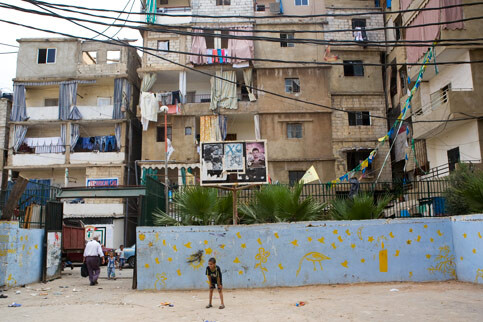The Electronic Intifada 6 December 2007

A young goalie waits for his fellow footballers in the Shatila Palestinian refugee camp in Lebanon, August 2007. (Matthew Cassel)
Anyone familiar with Israeli politics was not surprised that Israeli Prime Minister Ehud Olmert did not acknowledge Israel’s occupation in his speech at Annapolis. What was surprising was that short of mentioning the “R” word — “refugees” — Olmert implicitly acknowledged the Palestinian refugee problem.
Referring to the Palestinians, the Israeli prime minister stated in his Annapolis speech: “Your people, too, have suffered for many years; and there are some who still suffer. Many Palestinians have been living for decades in camps, disconnected from the environment in which they grew up, wallowing in poverty, in neglect, alienation, bitterness, and a deep, unrelenting sense of humiliation.” Olmert’s characterization of the refugees is only partially correct. Poverty, neglect, alienation, bitterness and feelings of humiliation, are only one component of the refugee experience. There are also other components, such as community, pride, generosity, and perseverance. This one-dimensional characterization obviously suits Olmert’s conception of a solution. It also casts refugees as objects that will be acted upon (once again), rather than subjects who can genuinely participate in finding a solution. A recent article in the Israeli daily Haaretz titled “Refugees and Jerusalem: A question of money” sheds light on Olmert’s statements. The article revealed the outlines of the deal being cooked to sell the rights of the Palestinian refugees.
In addition to oral testimonies given both by Palestinian refugees and Jewish combatants, many official documents describe policies and actions taken by Jewish militias which were designed to expel Palestinians from what has become the state Israel during its establishment. According to Israeli Historian Benny Morris, “In the months of April-May 1948, units of the Haganah [the pre-state Zionist militia that was to become the IDF] were given operational orders that stated explicitly that they were to uproot the villagers, expel them and destroy the villages themselves.” Yet Olmert presented the refugee issue as a humanitarian problem, not unlike one caused by a natural disaster, saying that “Israel will be part of an international mechanism that will assist in finding a solution to this problem.” Olmert made it clear that he was not admitting Israel’s responsibility for creating the problem by saying, “I came here today not in order to settle historical accounts between us,” and by equating the Palestinian refugee problem with the “constant suffering of many Israelis.”
The solution Olmert suggests is “an international effort, in which we [Israel] will participate, to assist these Palestinians in finding a proper framework for their future, in the Palestinian state that will be established in the territories agreed upon between us.” The suggestion that the refugees do not have the choice to return to the lands from which they were expelled, but instead “return” to a future Palestinian state, is contrary to international humanitarian law, and to UN Resolution 194 that “Resolves that the refugees wishing to return to their homes and live at peace with their neighbors should be permitted to do so at the earliest practicable date.” Despite this, the US President George W. Bush promised Ariel Sharon in a letter on 14 April 2004 “an agreed, just, fair and realistic framework for a solution to the Palestinian refugee issue as part of any final status agreement will need to be found through the establishment of a Palestinian state, and the settling of Palestinian refugees there, rather than in Israel.” Despite the illegality of these promises, they were ratified on 23 June 2004 by both the US House and Senate. Olmert refers to this letter in his statement as a point of departure for the negotiations.
Working groups are now developing plans to implement Bush’s promise. According to Haaretz, the Aix Group, “a semi-official political-economic backchannel” is developing a plan for Palestinian refugees. The Aix Group’s members include Israeli, Palestinian and international economic experts, academics, members of economic organizations, and officials from international institutions, including the World Bank, the International Monetary Fund and the European Union, who participate in the Aix Group in their personal capacities.
The group is administered by a steering committee led by Prof. Gilbert Benhayoun, a Moroccan-born Frenchman, Prof. Arie Arnon, an economics professor from Ben Gurion University in Be’er Sheva, Said Bamya, the former deputy minister for economic affairs in the Palestinian Authority, Dr. Ron Pundak, director of the Peres Center for Peace and Dr. Samir Hazbun from DATA Studies and Consultation. Other partners include the European Union, French donors, the World Bank, the French Foreign Ministry, the International Development Research Center in Canada, the General Council of the Bouches du Rhone, and the Regional Council of Provence-Alpes-Cote d’Azur.
The Aix Group’s document opens with a declaration of principles stating that an agreed and just long-term solution to the problem of the 1948 refugees must be based on the relevant United Nations resolutions, including General Assembly Resolution 194, but then nullifies that statement by saying that “a literal application of this Resolution is no longer possible given the substantial changes on the ground.” The document then describes an arrangement that would substitute for the UN resolution that they have deemed no longer applicable, stating that “The parties would agree that the measures recommended in the paper implement Resolution 194.”
The reference to “substantial changes on the ground” as an obstacle that renders the UN resolution inapplicable perpetuates the myth that physical or material obstacles render return impossible. According to Salman Abu Sitta, an expert on the Palestinian refugee issue, “90 percent of the village sites are still vacant, 7 percent are partially built over, and only 3 percent are totally built over in Tel Aviv and West Jerusalem.” Of course, there are obvious issues that would have to be addressed. But these problems have been dealt with in many places, such as Bosnia, Kosovo and Tajikistan, to name a few, and pose no obstacle in and of themselves to return. A hint to what the real obstacle may be lies in Haaretz correspondent Akiva Eldar’s statement that “The Aix Group is convinced that if bold steps are not taken in the right direction, the vision of one state for two peoples, based on joint citizenship and equality before the law, will be placed on the agenda.”
The group suggests that an international committee of experts would determine what constitutes “fair and full” compensation for property claims. They estimate that the total cost of these claims will be between $15 billion and $30 billion.
The group makes it clear that in cases in which “fair and full compensation” is offered, “restitution” (the right of return) will not be considered. This formulation turns the basic principle set in the UN Principles on Housing and Property Restitution for Refugees and Displaced Persons totally on end. The UN principles clearly note that restitution is the primary remedy, and compensation only comes into play if refugees themselves choose compensation, or if restitution is factually not possible as determined by an independent tribunal.
“Palestinian refugees will be asked to choose a permanent place of residence, the group proposes that the individuals choose more than one alternative and rank their priorities.” But the implementation of this choice depends on “the states concerned,” including Israel. Aix proposes to create an International Agency for the Palestinian Refugees that will be responsible “to ensure that the final decisions satisfy the wishes of the refugees as much as possible and are in line with the overall agreements to be signed between the representatives of the two sides, and possibly also with the relevant host countries and other countries.”
The Aix group expects that a large number of refugees will choose to relocate to other countries at the cost of $8 billion to $19 billion, depending on how many refugees will choose to move from their current country of residence. The plan suggests that some of the Palestinian refugees will be rehabilitated in their current locations and will receive compensation “in kind or in money” at a cost of $10 billion to $14 billion.
In addition, the group recommends the creation of a fourth fund, which will require about $22 billion, for compensation relating to “refugeehood” not related to property claims or the other programs. All the registered refugees will receive a uniform amount of about $5,000 each. According to Haaretz, the money can be attained in a period spread out over 10 years and with extensive, generous international aid.
Under international humanitarian law the right of refugees to return to their homes is an inalienable, individual human right. Like all human rights, it is invaluable and cannot be bought. Under Israel and Bush’s “solution,” Palestinian refugee families who had been expelled from what is now Israel would be consigned to return, not to their homes, but to small, non-contiguous parts of less than 22 percent of their original homeland. Jews from anywhere in the world, on the other hand, would be free to “return” to more than 78 percent of historic Palestine, frequently to live on land seized from those same Palestinian refugees. Such clear discrimination against Palestinian refugees and privileging of Jews from anywhere in the world illustrates clearly that these proposals would further a separate but unequal solution that cannot result in peace.
Neta Golan is an Israeli peace with justice activist living in Ramallah, and a founder of the International Solidarity Movement. For more information see: http://www.apartheidmasked.org.
Related Links



